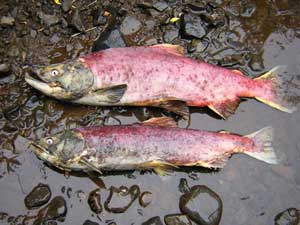 by NED ROZELL September 19, 2005
A shorter lifespan appears to be a good strategy when bears are plucking your comrades from the water next to you, Carlson reported in Anchorage at a recent meeting of the American Fisheries Society. She is a graduate student at the University of Washington enrolled in its Alaska Salmon Program. For more than 50 years scientists involved with the program have studied one of the world's richest salmon areas, Bristol Bay. Carlson spent parts of the last five summers in and around salmon streams that flow into Bristol Bay near Dillingham. She has pulled on a wetsuit in order to watch sockeye in Iliamna Lake, and she and her coworkers also attached tags behind the dorsal fins of salmon migrating back to five streams in the Wood River Lakes system. There, Carlson tracked the lives of specific sockeye as they deteriorated upon entering fresh water. During the breeding season, salmon enter the streams and lakes of their birth after three-to-five years of living in the ocean. The fish stop feeding when they leave the ocean, and male sockeyes' jaws and snout curve and they develop humps in their backs. Both males and females turn bright red and grow paler as they approach the end of their lives. By the time the fish die, within a week or so of leaving the ocean, the sockeye will have burned 85 percent of their stored fat reserves, according to Carlson. She and her colleagues tagged hundreds of salmon at the mouths of five streams in the Wood River Lakes area. In the days that followed, Carlson and others walked along the creeks, tracking the same salmon for days and writing down how long they lived. She noticed differences in salmon lifespans in areas where bears were better able to catch salmon. "Where bear activity was intense, the fish had shorter lifespans," Carlson said. "(Their freshwater lifespans) could be as short as five days. Where bear activity was high, the strategy seemed to be 'breed as soon as you get in the creek.'" Living longer was not an advantage in areas with lots of bears, Carlson said. For example, female salmon that spawned their first few days in the creek would pass on more genetic material than the unfortunates that opted to wait five days and became a meal for a bear before they dropped eggs. Biologists have seen genetic selection for a shorter lifespan in some other species. Opossums on the North Carolina mainland seem to live shorter lives than opossums on a small island off the coast that's not exposed to as many predators. Water fleas that breed in ponds as opposed to lakes also seem to select for a shorter lifespan to increase their chances of reproducing, Carlson said. Working on streams clogged with salmon and the brown bears they attract features a few more risks than studying opossums or water fleas. When Carlson did her fieldwork, she always had a few buddies along. "We always walked in groups of three," she said. "It was pretty common to walk around a corner and see a live fish on the shore with a bite out of it, and you knew a bear was there 30 seconds ago." This column is provided as a public service by the Geophysical Institute, University of Alaska Fairbanks, in cooperation with the UAF research community. Ned Rozell [nrozell@gi.alaska.edu]is a science writer at the institute. Publish A Letter on SitNews Read Letters/Opinions Submit A Letter to the Editor
|
||
